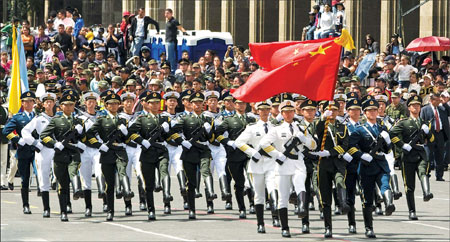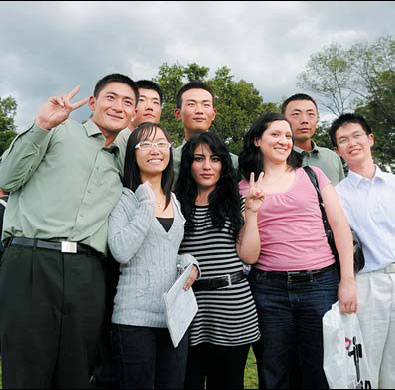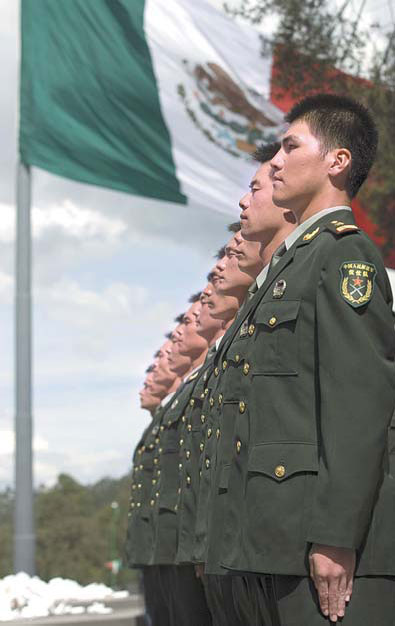Life and Leisure
Stepping out
By Peng Kuang (China Daily)
Updated: 2010-10-18 08:28
 |
Large Medium Small |
|
The People's Liberation Army honor guard marches at this year's Mexican Independence Day Parade. Dai Wei / Xinhua |
|
A member of the PLA honor guard walks through its dormitory at a university in Mexico City. Bao Feifei / Xinhua |
|
Members of the PLA honor guard pose with college students in Mexico City. Bao Feifei / Xinhua |
|
The PLA honor guard trains in Mexico City. Bao Feifei / Xinhua |
The PLA honor guard shows off the nation's 'soft military strength' at Mexican Independence Day Parade. Peng Kuang reports
Zhu Zhenhua was surprised to see that cadets from the United States Military Academy, the famous "West Point" - which is known worldwide for its meticulousness - appeared quite different from what he had imagined.
"They are more like college students," Zhu says, describing what he saw when attending the Mexican Independence Day Parade as a member of the People's Liberation Army honor guard.
Zhu served as the flag-bearer in the 34-member team that was sent to Mexico City in September, the first time the PLA's honor guard had performed an overseas task since its foundation.
Mexico celebrated the 200th anniversary of its independence from Spain on Sept 16. Militaries from 17 countries - including China, the US, France, Brazil and Germany - participated in the parade.
The demonstration of China's military attracted the world's attention when worries about its development were aired in the Pentagon's Annual Report on Military Power of the People's Republic of China, published this year.
It was a new experience for Zhu and his 33 colleagues, who rarely get the opportunity to face the outside world.
"When they came to us to exchange gifts, I felt pure friendship, without any hesitation," he recalls.
"We do have quite different ideas on some things with (the foreign soldiers). They know about Mao Zedong, they know about the Great Wall - but still, they know little," Zhu says.
"They can improve their knowledge about China a little bit more through us. But if they can come to China, that will be much better."
Zhu says there's little difference between countries on the parade ground. "There is no winner or loser on the parade ground, there are only different cultures," he says.
"What is really important is the harmonious atmosphere it creates when worldwide military forces are presented on the same ground."
Liu Bo, a PhD at the University of National Defense thinks of the honor guard as the country's "soft military strength".
He says the Chinese army faces the problem of non-conformity between its foreign image and its development.
Senior Colonel Zhao Xiaozhuo, an expert on US military affairs at the Beijing-based Academy of Military Science, says that military relations are often the final part of improving foreign relations.
"China's military ties with foreign countries are making progress, with the help of developing diplomatic ties and improving political trust."
Zhao says that he believes opening to the outside world is an inevitable trend for China's military development.
"Worries and concerns about China's military development come mainly from the fact that it is moving so fast," Zhao says, adding that, under these circumstances, China has to explain.
Commander of the PLA honor guard Liu Shixu says that to be with troops from 16 other countries and communicate with them was a great learning experience.
"We need to know their culture as much as possible, and then are we able to be real friends. Respect must come from each side."
The honor guard is the highest form of respect a country has to offer, Liu says. "When the troops return to their countries, when they become military heads, the Chinese armed forces they saw will pop into their minds and affect their (future) decisions that are relevant to the Chinese military."
Liu was impressed by the warm welcome of the Mexican people. "They were cheering 'China! China!' all along the parade route," he recalls.
Zhu's colleague, executive officer of the team Zhang Hongjie, says he regards the differences between the troops as different ways of expressing the same honor and pride a soldier feels serving his own homeland.
"When we were training, soldiers of another country were playing football," Zhang says, smiling. "I am sure they thought we were 'different', too, but it is just good for us to have the chance to get to know about each other."
Senior Colonel Huang Xueping, a military official from the Defense Ministry's foreign office, which organized the honor guard's visit to Mexico, says it was not only a chance to communicate in the realm of military affairs, but also to exchange military culture.
"It was a good opportunity to show the world China's military etiquette, and our history."
Huang adds that good China-Mexico relations support developing bilateral military ties.
The author is a reporter with PLA Daily, the article is translated and edited by Ma Liyao.



